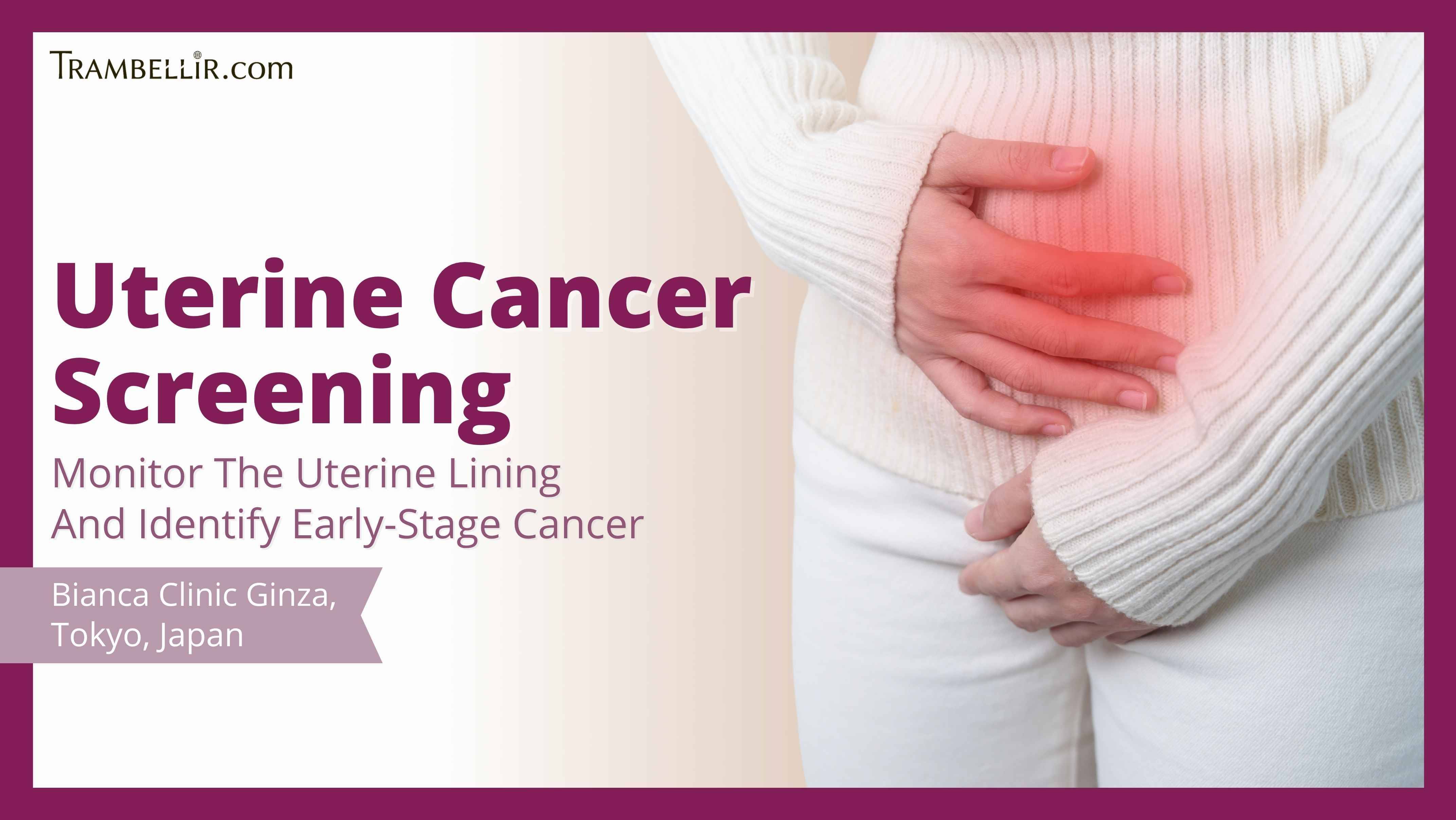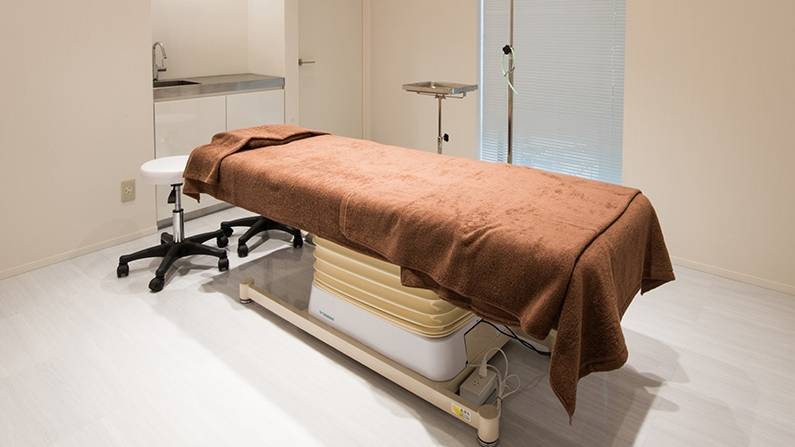It is Suitable For
· Those in Tokyo looking to monitor their reproductive health.
· Those with family history of uterine or colon cancer.
· Those with unusual vaginal bleeding or discharge.
· Those who want to monitor their endometrial thickness.
· Those who wish to detect any issues in their uterus before they become serious.
What is Uterine Cancer Screening?
Uterine Cancer Screening is a process used to check for signs of cancer in the lining of the uterus, also called the endometrium. This condition, known as endometrial cancer, can begin with small changes in the cells of the uterine lining. Screening may help find these changes early, especially when certain symptoms are present, such as unexpected vaginal bleeding. It is also helpful for those with higher risk factors, including a strong family history of uterine or colon cancer, genetic conditions like Lynch syndrome, or past hormone-related conditions.
The goal of screening is to detect cancer as early as possible, when it may be easier to treat and less likely to spread. This may involve imaging tests such as transvaginal ultrasound to measure the thickness of the endometrium or procedures that collect a small sample of the uterine lining, such as an endometrial biopsy. In some cases, other tools like hysteroscopy or dilation and curettage (D&C) may be used to get a clearer view or collect more tissue. Early testing can help guide the next steps and support better health outcomes.
How It Works
Uterine Cancer Screening typically begins with a review of medical history and symptoms, followed by one or more tests to check the condition of the uterine lining. A transvaginal ultrasound will be used as the first step. This imaging procedure takes about 15 to 30 minutes and involves placing a small probe into the vagina to capture detailed images of the uterus and measure the thickness of the endometrial lining. If any thickening or irregularities are seen, the next step may be an endometrial biopsy. This test usually takes around 10 to 15 minutes, which involves gently inserting a thin, flexible tube through the cervix into the uterus to collect a small tissue sample.
These procedures are generally quick and can be done in an outpatient setting. It does not require local anesthesia and involves little to no downtime. Some mild cramping or light spotting may be experienced afterward, which usually resolves within 1 to 2 days. In most cases, normal daily activities can be resumed on the same day.
Uterine Cancer Screening Procedure
1. Consultation will be conducted with the doctor.
2. A transvaginal ultrasound will be performed.
3. A thin ultrasound probe will be inserted.
4. Endometrial biopsy will be taken to collect tissue samples.
5. The sample will be sent to the laboratory.
6. A follow up visit will be scheduled by the doctor for results analysis.
Advantages and Limitations of Uterine Cancer Screening
<Advantages>
· Detects cancer early before symptoms become severe
· Monitors changes in the endometrial lining
· Identifies abnormal thickening of endometrial
· Supports reproductive health
· Reduces long-term health risk
<Limitations>
· Results may be influenced by hormonal changes, menstrual cycle phase, recent vaginal infections, or the presence of non-cancerous conditions such as fibroids or polyps
· Temporary cramping, spotting, or light bleeding may occur for 1 to 2 days after screening
Uterine Cancer Screening Preparation
· Avoid using tampons, vaginal creams, or douching for at least 2 to 3 days before the screening
· Avoid sexual intercourse for 1 to 2 days before the screening
· Inform doctor for any on-going medications, allergies, and medical conditions
· Avoid taking the screening during menstrual period
FAQ
Q1: Is Uterine Cancer Screening safe for postmenopausal women?
A1: Yes, Uterine Cancer Screening is safe and often recommended for postmenopausal women, especially those experiencing bleeding or other changes.
Q2: When will the results of Uterine Cancer Screening be available?
A2: The results of Uterine Cancer Screening usually will be available within 3 to 7 days. A follow-up consultation will be scheduled by the doctor at our affiliated clinic to explain the findings and discuss any next steps.
Q3: Does Uterine Cancer Screening prevent uterine cancer?
A3: Uterine Cancer Screening does not prevent cancer, but it helps detect it early, allowing for faster and more effective treatment.
Q4: Can Uterine Cancer Screening affect fertility?
A4: No, standard screening procedures for Uterine Cancer Screening like ultrasound and biopsy do not affect fertility. These are diagnostic tests, not treatments.
Q5: Is Uterine Cancer Screening safe for pregnant women?
A5: Uterine Cancer Screening is generally not recommended for pregnant women unless there is a strong medical reason.
Clinic Information
[Clinic Name] Bianca Clinic Ginza
[Location] Tokyo, Japan
[Nearest Station/ Nearest Tourist Destination] 5 mins drive from Tokyo Station, Ginza Sony Park, as well as many other attractions nearby
[Clinic Opening Time] Monday to Sunday (10:00AM - 7:00PM)
| Operation Time |
Transvaginal Ultrasound: 15 - 30 mins
Endometrial Biopsy: 10 - 15 mins
Result Analysis: 3 - 7 days
|
| Recovery Time |
None |
| Number of Postoperative Visit |
Not required |
| Hospitalization |
Not required |
| Limitations |
Temporary cramping, spotting, or light bleeding may occur for 1 to 2 days after screening
|
| Cancellation Policy |
No charge for cancellations made at least 48 hrs prior appointment date* |
| Include In This Price |
Interpreter Fee, Tax |
| Location |
Japan, Tokyo, Chuo City, Ginza, 1 Chome−5−6 BIANCA CLINIC 銀座 |
Terms of Service
Trambellir is a health tourism platform and does not in any way provide, promote, or sell any
medication or medical treatment to the Customers.
Customers are advised to contact the healthcare providers directly for any enquiries related to
medical treatments.










